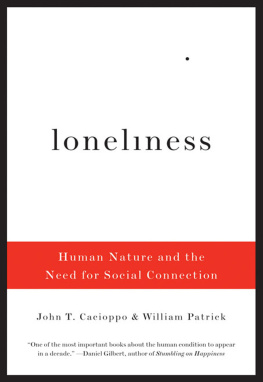
Loneliness
In recent years its medical implications have brought loneliness to the centre of attention of mass media, government agents, and the general public. However, as this volume demonstrates, loneliness is not merely a psychological, individual, or health issue. In multiple ways, it is a serious social problem as well.
Yang urges fellow researchers and scientists to broaden the existing definition and classification of loneliness, to measure loneliness with greater accuracy, and to establish more specifically the connection between loneliness and particular illnesses. Drawing on vast sources of data, including literary works, case studies, and large-scale sample surveys covering a broad spectrum of countries (Europe and beyond), the empirical research of this study produces and presents simple but effective evidence for the social nature and variations of loneliness.
Examining loneliness at higher levels, including ethnic groups, classes, national cultures, and societies, Loneliness will appeal to students and researchers interested in areas such as sociology, psychology, and mental health.
Keming Yang is an associate professor of sociology at Durham University, UK.
Routledge Advances in Sociology
The Sociology of Knowledge Approach to Discourse
Investigating the Politics of Knowledge and Meaning-making
Edited by Reiner Keller, Anna-Katharina Hornidge, Wolf J. Schnemann
Christianity and Sociological Theory
Reclaiming the Promise
Joseph A. Scimecca
Ageing, Diversity and Equality
Edited by Sue Westwood
Cinematic Tourist Mobilities and the Plight of Development
On Atmospheres, Affects and Environments
Rodanthi Tzanelli
Bicycle Utopias
Imagining Fast and Slow Cycling Futures
Cosmin Popan
Islamophobia in Muslim Majority Societies
Edited by Enes Bayrakli and Farid Hafez
Equ ine Cultures in Transition
Ethical Questions
Edited by Jonna Bornemark, Petra Andersson, Ulla Ekstrm von Essen
Loneliness
A Social Problem
Keming Yang
For more information about this series, please visit: www.routledge.com/Routledge-Advances-in-Sociology/book-series/SE0511
First published 2019
by Routledge
2 Park Square, Milton Park, Abingdon, Oxon OX14 4RN
and by Routledge
52 Vanderbilt Avenue, New York, NY 10017
Routledge is an imprint of the Taylor & Francis Group, an informa business
2019 Keming Yang
The right of Keming Yang to be identified as author of this work has been asserted by him in accordance with sections 77 and 78 of the Copyright, Designs and Patents Act 1988.
All rights reserved. No part of this book may be reprinted or reproduced or utilised in any form or by any electronic, mechanical, or other means, now known or hereafter invented, including photocopying and recording, or in any information storage or retrieval system, without permission in writing from the publishers.
Trademark notice: Product or corporate names may be trademarks or registered trademarks, and are used only for identification and explanation without intent to infringe.
British Library Cataloguing-in-Publication Data
A catalogue record for this book is available from the British Library
Library of Congress Cataloging-in-Publication Data
A catalog record for this book has been requested
ISBN: 978-1-138-55302-6 (hbk)
ISBN: 978-1-315-14841-0 (ebk)
Typeset in Times New Roman
by Apex CoVantage, LLC
In prefaces, authors explain why they write a particular book. Among social scientists the reason is usually either addressing an important issue, or producing a text required for students and others to understand an important subject, or both. The books, however, are not supposed to relate to the authors personally, at least not explicitly a social science monograph should not be confused with a biography or a memoir. The topic of this book is a bit different, however: besides its timeliness and the need for it, which I shall explain here and in the first two chapters, it will be difficult for a book on loneliness, or any other personal experience, to escape the suspicion that the author is writing it out of personal experience and interest.
Yes, that is true in the case of this book. I do not want to hide it. As far as I can recall, starting from my primary school years, loneliness has been a familiar experience to me, on and off with irregular frequencies, durations, and intensities, although I might not consciously use the word loneliness to describe the feeling at a particular moment: loneliness because no other children went home together with me after school, loneliness when I found nobody at home after school, loneliness because I was the only one who could answer a difficult question in class, loneliness every time I changed school, loneliness when I could not find anybody to agree with me on something, loneliness every time I moved from one country to another, loneliness when my job applications or journal papers were turned down, and loneliness when I feel that no one else understands me The list is long.
While loneliness is painful, I did not take loneliness as a serious problem until I read the academic literature about it. After studying sociology as my major subject, I have learnt from C. Wright Mills that although sociologists were encouraged to start their academic research by considering their personal experiences and feelings, they were obliged to study such experiences and feelings from the perspectives, and for the benefits, of the society as a whole. I started to realize that loneliness was not a personal and minor problem of my own when I learnt that many famous people, such as Princess Diana and Bertrand Russell, were very lonely, at least for some time. I also found that millions of people across the world were lonely; it is a common feeling among international students, mothers taking care of their babies, and older people, either living in private residences or nursing homes. My personal experiences did help me develop certain direct grasp of the issue, but this book goes beyond them in many ways and is written about, and for, every lonely human being and everyone who cares about them.
The prevalence of an issue may not be a sufficient justification for the production of a book about it. I still would not have a case for writing a book about loneliness if loneliness is not serious enough: what if it is only a transient and minor feeling without causing serious harms? As the first chapter demonstrates by summarizing the current research, loneliness could do seriously harm to our physical as well as mental health; but if not always, then when? What if loneliness could be even beneficial, as some have argued? It could even teach us something about ourselves and life in general, but how? If it is harmful, what are the causes and how could we prevent it? People of different social groups are vulnerable to different levels of risk to loneliness, so who are at a higher risk and why? These are important questions without well-established answers, at least not yet, which is another reason why a book such as this one is needed. So far most research on loneliness has been done by psychologists, psychiatrists, and researchers in medicine, health, and ageing. They are mostly interested in two questions: What does loneliness do to us? How to deal with it?











